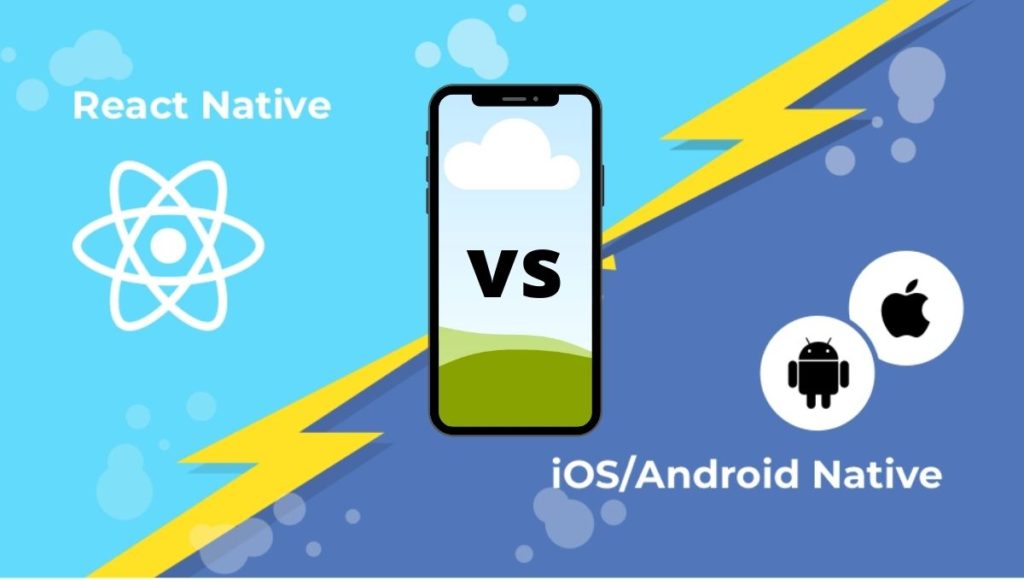Table of Contents
Mobile applications can be called an inseparable part of our lives. We use them on a daily basis to perform numerous tasks like ordering goods and food, learning, contacting people and various service providers, and many more. So no wonder that many businesses go mobile and develop their solutions to satisfy customer needs and boost their productivity.
If you’ve decided to digitalize your business and develop a solution for mobile devices, then this article is for you. It will help you to understand what approach to app development is better and whether you should be afraid of cross-platform solutions. We are going to explain what distinguishes native apps from apps built on React Native and describe what the main pros and cons of both approaches are. So, without further ado, let’s get started!
What are React Native and cross-platform solutions?
You’ve probably heard something about native mobile applications, but do you know about cross-platform solutions and how they are built? First of all, it is necessary to explain what differs cross-platform solutions from native ones. They are created for both iOS and Android devices. So basically, you have one solution that fits both platforms and has an outstanding performance, intuitive UX, and visually pleasing UI. Most cross-platform mobile solutions are built using React Native, which is a framework made by Facebook. It is reliable and makes the app development quite seamless. That is why it is considered to have huge business potential.
So let’s take a closer look at React Native and what makes it so good and convenient. It should be mentioned that React Native is based on React.js, which is written in JavaScript. As you may know, JavaScript is a prevalent language, and it is always easy to find a tech take who mastered it and can create perfect solutions on its basis. That is one significant advantage of React Native as well – it is easy to comprehend and use, so it will not take long to find a great developers team to create your solution. And in business, time means a lot!
Some people argue that it is always better to choose a native app development over the cross-platform one. However, based on our experience, we can say that everything depends on the nature of the project. Sometimes React Native is even better.
The main thing all business owners think about when they decide to build a solution is its quality. Nobody wants to end up having an app with the code of awful quality and numerous bugs. So there is a myth that while building a cross-platform solution, you will face too many difficulties, and your solution will be worse than the native one. That is not true. Because sometimes, it is even easier to create a slow and buggy native app while a cross-platform solution will be better.
The final look and performance of the solution depend directly on the developers that you are hiring. So even engineers that work with React Native should have a background of native coding and have strong skills and extensive experience in this field.
Cross-platform apps built using React Native can be useful for your business because:
- They can be released much faster than the native ones, which reduces your time-to-market and increases chances to boost your business at once.
- You will ensure an overall mobile presence since you’ll have an app for both iOS and Android and will reach out to more potential customers.
- The development cost will be reduced because you will need to hire less developers compared with the number of professionals that native app development requires.
- Testing will be performed faster (especially if we speak about regression testing).
- It will be much easier to fix all the bugs on the go and consider some rapid alterations.
- You need to sacrifice neither UI nor performance.
- Whenever you feel that your app can be improved you can consider customizing it and making it native.
- The technologies can be mixed, which creates the possibility of getting an advanced solution in the end.
If you still have doubts about whether React Native is right, think about all great and successful applications built on it – Instagram, Bloomberg, Uber Eats, and many other Uber-like solutions, and many more. The possibilities are endless.
Main differences between React Native and Native app development
Before choosing the technology stack and initiating the development of your solution, it is always better to think about several options and weigh their pros and cons. After all, you are going to invest money in building your Android and iOS application, and ensuring that the results will meet all your expectations, you need to be aware of all possible risks and pitfalls.
We have thought about some main aspects that every business owner should know about React Native and native app development and highlighted the main ones. We are going to describe them briefly so that you can see and decide whether cross-platform solution development is for you or maybe you need a native app.
Support of applications
When it comes to React Native solutions, you should know that they do not have parent support. This means that anytime your app may stop being accepted by App Store or Google Play Market just because it is developed using React Native. Such situations have happened before. The thing is that React Native is a new technology and it is still in beta testing that can be a con influencing the possibility of you app to be published on mobile stores.
As to the native solutions, they are built for a specific operating system (iOS or Android) and they meet all requirements of it. Therefore neither Google nor Apple will restrict the publishing of such solutions (unless they violate any of the store’s policies).
Performance
As we’ve already mentioned, it would be unfair to claim that only native apps have an outstanding performance because cross-platform ones are no worse. It’s just certain peculiarities should be taken into account. For example, there can be some difficulties with animations. They may be not so high-quality and will run not so smoothly because of hybrid code. Since the app is written for both platforms at once, this can cause some processor loads, slowdowns, or lags.
Also, one main con of React Native apps is that they make the battery on the device run out faster because they load the system more.
The native applications turn out to be more effective and cause less problems because their code is written separately for each platform – iOS and Android. Also, native coding allows us to use all capabilities of the device and solutions to the fullest, which makes it possible to get access to the highest attainable framerate, speed, computing power, graphics support, etc..
User Experience
Unfortunately, cross-platform applications tend to offer worse UX quality compared to native solutions because they don’t fit the environment on the device they are launched on. Native applications will always have a more natural “feeling” because they take into account all peculiarities of the devices they are built for.
When building cross-platform solutions, it is hard to take into account all popular devices, their screen sizes, and types, which leads to slightly worse UX.
Community of developers
Needless to say that native app developers have a larger community because this approach is older. So if you will need to find any specific library, API, or anything else, it will be easier to do if you are dealing with native app development. React Native is new, and its community is much smaller. Therefore if your developers will face a professional challenge, there might not be an expert to help them, answer the questions or provide documentation.
A more significant community always means that you will face fewer mistakes during the development because you have enough guides and forums to look through. A smaller community means that you may be a pioneer who will look for a solution to a problem alone. With native development, you receive such advantages as access to debugged versions of code, generally accepted solutions, and ready-made libraries. With React Native you should be ready to spend time on coming up with custom solutions to issues and your own workarounds.
That is why native app development may take less time than React Native one. The presence of all essential guides and experts who can share an experience lets you avoid numerous pitfalls.
Development cost
In terms of budget, React Native can be called a more money-saving approach (only because you are not going to build 2 separate solutions for different operating systems). However, you should not forget the risks (that stores will not publish your app) and the sacrifices (the overall quality and UX).
As a team of professionals, we would recommend you to develop an MVP of your app first if you have a limited budget and to check your idea – whether it is good enough and whether it can be a success. You can build a native app with a certain set of crucial features and then improve and extend it with time. MVP is always a good idea, especially if you are not 100% sure in your idea and don’t want to lose your budget.
Maintenance
It is much easier to maintain native apps than cross-platform ones due to the peculiarities of coding. When you develop a solution on React Native, there is still a need to incorporate some separate native components for iOS or Android. So in terms of maintenance, this means that you will have to hire at least one native developer to fix and update your mobile app.
Also, one crucial point is that the maintenance budget will be higher for React Native solutions because it is harder to support and check hybrid code in general and else the particular parts of it that are native.
Releases of new versions
Needless to say that all mobile applications require updates with time. The trends and the needs of users change, so it is crucial to keep your solution competitive and up to date. Therefore before choosing whether to build a native or cross-platform app, pay special attention to the specificities of new versions releases.
What you should know about react native apps – they can suddenly stop working on all platforms if the error appears in code. And if it breaks after you have stopped working with the developer, then finding a new programmer who will deal with error correction will be more difficult and expensive. So to update your solution and release a new better version of it will not be an easy task. As to the native apps, the functionality can be added whenever you need this and all possible errors in code are much easier to identify and fix on the go.
| Criteria | React Native | Native App Dev |
| Acceptance by stores | worse | superior |
| UX quality | good | superior |
| Performance | high | superior |
| Dev Community | small | huge |
| Development cost | lower | higher |
| Maintenance | hard | easier |
| Functionality | limited | unlimited |
FAQ
To sum it up
To digitalize your business is always a good idea because a mobile application is a must-have these days. However, it is not enough to have a great idea in mind and enough money in your pocket to get a highly functioning solution able to attract many potential customers. You need to choose whether you need a native or cross-platform solution. They both have their pros and cons, and the selection of the perfectly fitting technology stack depends on your particular business goals.
If you choose to build an app for iOS and Android on React Native, then you should be ready to face some challenges. This framework is rather new, it requires the addition of native parts of code, and it may take some time to fix some issues that cross-platform apps will have. There are also some risks that the official mobile stores will not accept your solution. However, React Native app development is fast, cost-effective, and you can always turn your cross-platform solution into a native one.






